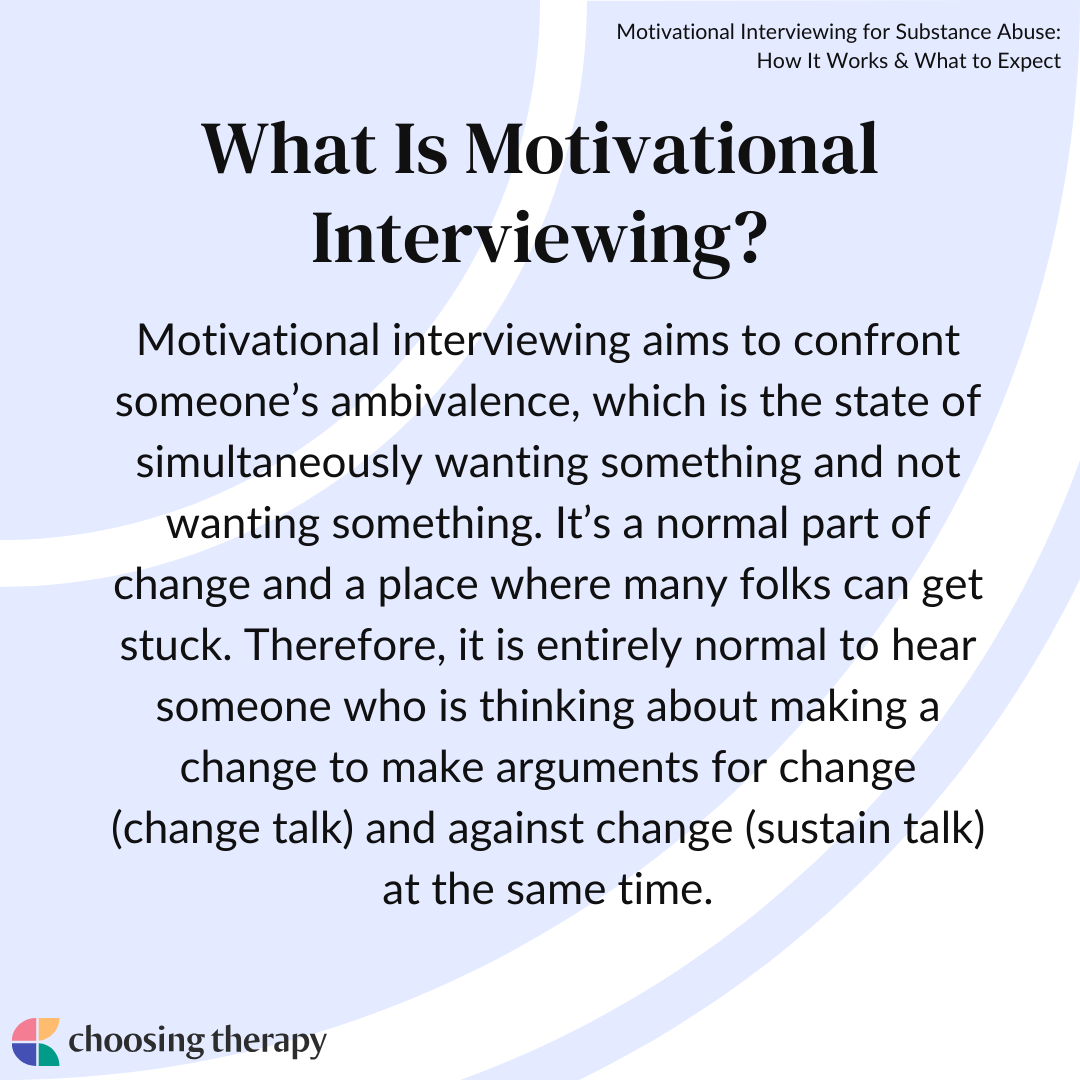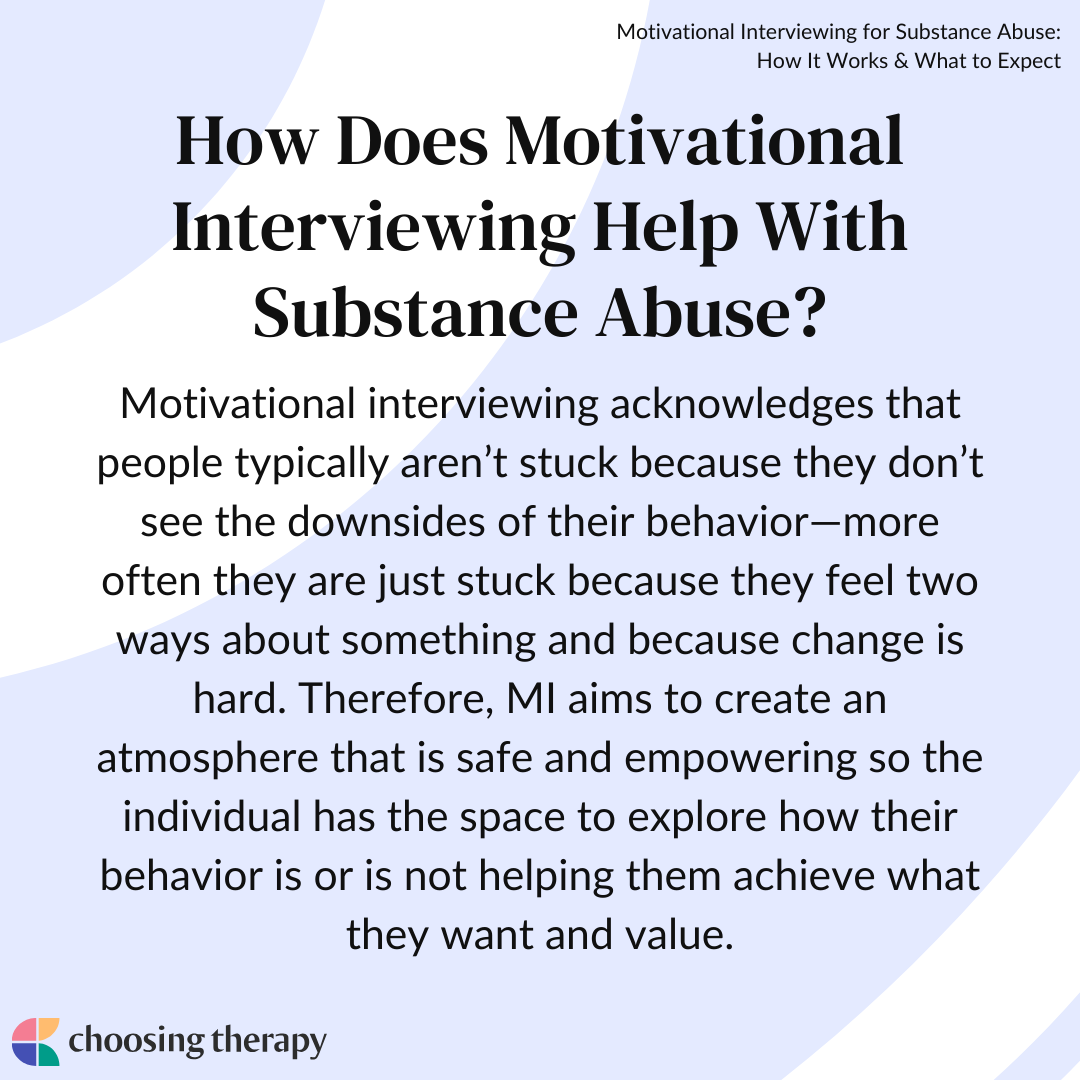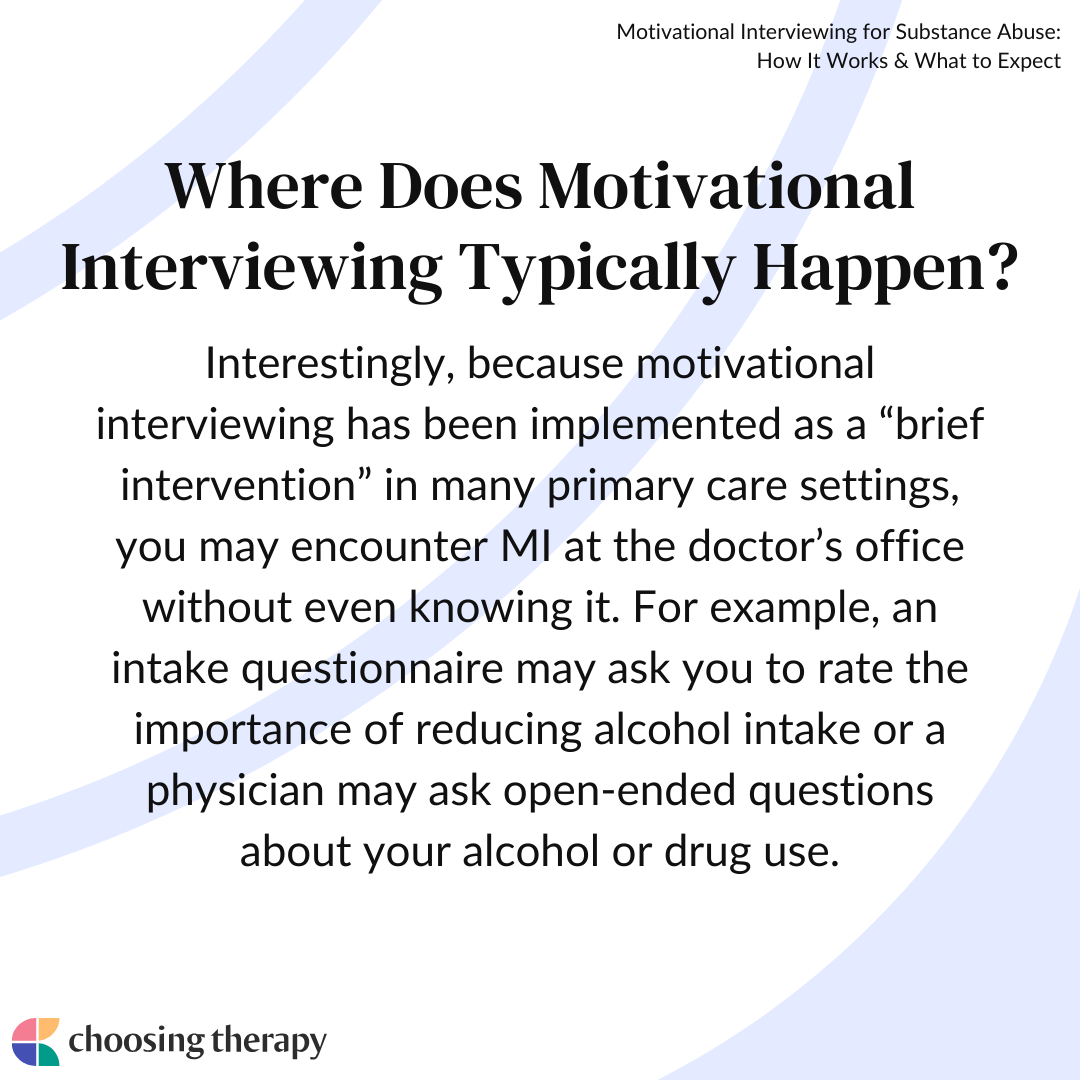Motivational interviewing (MI) is a therapeutic method that was developed to increase someone’s readiness to make a change by helping them explore and resolve their ambivalence about the change.1 Motivational interviewing is now used widely to increase motivation for a range of behavior changes, but it was originally developed to treat substance misuse and remains highly effective.
Motivational interviewing interventions are typically brief and have shown to be effective after as few as four sessions.
Bicycle Health: Telehealth Treatment For Opioid Use Disorder Medically Assisted Treatment For Addiction (MAT) Same Day Prescriptions Often Available 100% Online Covered By Most Major Insurance
What Is Motivational Interviewing?
Motivational interviewing aims to confront someone’s ambivalence, which is the state of simultaneously wanting something and not wanting something. It’s a normal part of change and a place where many folks can get stuck for a while. Therefore, it is entirely normal to hear someone who is thinking about making a change, to make arguments for change (change talk) and against change (sustain talk), at the same time.1,2
Another central concept in motivational interviewing is that the client should be the one making the argument for change, not the clinician. If getting people who misuse substances to change was as easy as telling them about all the negative effects of drinking too much or all the problems caused by using illicit drugs, we wouldn’t need any substance abuse treatments.
When a helper jumps in to make the argument for change, this naturally evokes the other side of the argument. Therefore, the clinician’s goal is to get the client talking, and then to listen hard for the client’s own arguments for making a change. The spirit of MI is collaborative and nonjudgmental, so it is done for and with a person, not to them.1
How Does Motivational Interviewing Help With Substance Abuse?
Some of the prevailing treatment models for substance abuse in the ‘80s included Scared Straight and “therapeutic” boot camps that used shame and guilt as their primary tools. In contrast, motivational interviewing acknowledges that people typically aren’t stuck because they don’t see the downsides of their behavior—more often they are just stuck because they feel two ways about something and because change is hard. Therefore, MI aims to create an atmosphere that is safe and empowering so the individual has the space to explore how their behavior is or is not helping them achieve what they want and value.
Motivational interviewing helps reduce substance abuse by increasing an individual’s intrinsic motivation to change. Thus, MI often begins by helping someone figure out what is important to them and then exploring the ways in which their drinking or drug use is or is not getting them closer to what they want. Through this exploration, the client is hopefully convincing themselves to move one step further in the change process.
Could Motivational Interviewing Help People Who Have Had Little Success With Other Treatments?
Motivational Interviewing can be very helpful for people who have had little success with other treatments. MI focuses on helping clients resolve feelings of ambivalence about changing their behavior, encouraging them toward commitment to taking positive action. After engaging in a course of MI, clients dealing with substance abuse may be better prepared to successfully complete other treatment options with newfound motivation and commitment to change.
The Four Processes of Motivational Interviewing
Motivational interviewing typically falls into four stages:
Engaging
The foundation of any therapy intervention is the therapeutic relationship. The purpose of the engagement process is building trust and collaboration between the client and therapist. This is achieved through the expression of empathy and acceptance, and the use of OARS – open ended questions, affirmations, reflections, and summaries.
Focusing
Focusing aims to establish goals that the client is committed to working toward through treatment. While some goals may be predetermined (or court ordered), this stage is really about helping the client to take ownership of their life and identify changes that they would like to make, personally. The therapist trusts the client’s expertise on their own life, and looks to the client to determine what support they need in order to make impactful life changes.
Evoking
Evoking is unique to MI, in which the therapist draws out “change talk” from the client, particularly regarding their goals established in the Focusing stage of treatment. Therapists draw out statements about the need for change from the client by asking open-ended questions, offering targeted reflections, and providing summaries of what the client has said. Instead of giving advice or lecturing the client on why they need to change, therapists instead gently evoke the client’s own inner desire to feel better through meaningful life changes.
Planning
Planning is something that clients may begin to do on their own, but the therapist may also guide the client in identifying potential barriers to change and problem-solving regarding these situations together, before they occur. The client discusses their plan for achieving their long-term goals in this final stage of treatment.
Help For Addiction Ria Health: Effective, Evidence-Based Alcohol Treatment 100% Online Quickly change your relationship to alcohol with our at-home program. On average, Ria Health members reduce their BAC levels by 50% in 3 months in the program. Services are covered by many major health plans. Visit Ria Health Workit Health – Online Treatment for Opioids or Alcohol, Including Medication. Modern, personalized recovery that combines medication, a supportive community, and helpful content. Covered by many insurance plans. Currently available in FL, TX, OH, MI, and NJ. Visit Workit Health Best Drug Addiction Rehab Centers – Find the best local detox or drug rehab center covered by your health insurance. Search by location, condition, insurance, and more. Read reviews. Start Your Search
Motivational Interviewing Techniques for Substance Abuse
The developers of motivational interviewing, William Miller and Stephen Rollnick, consistently emphasize that the style and spirit of MI (being collaborative, accepting, respectfully curious and guiding) is the most important tool that it can offer. Therefore, if any specific MI technique is used outside this collaborative and respectful context, it is no longer MI.
That being said, some common tools and techniques that are used in order to further the collaborative conversation about change are:
OARS
OARS is an acronym describing a few therapeutic tools that are important to MI. They are:
- Open questions: Therapists use open-ended questions that do not elicit a yes or no answer in order to draw out change talk from the client and build a trusting relationship.
- Affirming: Affirming the client’s desire to change and validating their emotions and experiences can build rapport and help the client build confidence in their ability to change.
- Reflecting: In MI, the therapist will often offer statements of understanding, or reflections, in order to help the client feel heard and supported. It can be therapeutic for a client to hear their own words repeated back to them, which can help them to make important realizations in the process.
- Summarizing: Summarizing can be another helpful way to validate and offer understanding as the therapist summarizes what the client has shared, in their own words. This helps to organize the client’s experience.
Meeting the Client at Their Stage of Change
Someone dealing with substance misuse could already know they have a problem and be motivated to change, or they could be avoiding this truth. The Stages of Change model outlines where someone could be at in the process of making a change, and MI can meet someone during any stage.
The stages of change are:
- Precontemplation: In this stage, the person is not yet considering change, or is opposed to change. The goal is to help the client consider the need for change in their life by seeing the negative impacts of current problems, and exposing dissonance between the client’s goals and current behavior.
- Contemplation: This is a stage of ambivalence, in which the client acknowledges a need for change, but isn’t taking action. The therapist helps the client work through their ambivalence so they are able to take steps toward meaningful change.
- Preparation: Here, the client commits to change and makes a plan to carry it out in their life. The therapist provides a strengths-based perspective and resources to help the client be successful.
- Action: Finally, the client implements the plan they devised and takes steps toward change. The therapist continues to support the client’s efforts and reinforces positive changes.
- Maintenance: As the client continues to maintain their new patterns of behavior, the therapist works with them to prevent relapse and continue to celebrate progress.
- Relapse: In the event a client relapses, the therapist will begin this process with them again, moving through the stages in order to get them back on track toward their goals while problem-solving what got in the way of their goals this time, and how to prevent similar situations in the future.
Values Card Sort
The values card sort is a structured tool for exploring values.4 This exercise can help the client clarify what is most important to them, while also helping the clinician understand the individuals’ desires and goals, which is critical for further exploration of how the addictive behavior is or is not consistent with their values.
The exercise is done as a “Q sort” wherein the client sorts a deck of value cards into three-five categories (ranging from not important to important). Next, the person typically narrows down the list or otherwise selects their most important values. These values will be a springboard for future discussions about motivation and change.
Evoking & Highlighting Change Talk
A primary underlying goal of the Motivational Interviewing therapist is to listen closely for the client’s own arguments for changing (called change talk) and then to highlight, or at least reflect back to them, their own reasons for changes. Sometimes this is done through the formal exercises (such as those described below) and other times this is done through asking questions designed to evoke different kinds of change talk.1
The acronym DARN summarizes some of these types of questions which aim to gather information about the client’s:1
- Desire for change
- Ability to change
- Reasons for change
- Need for change
Scaling Questions
One of the specific tools used to evoke the need for change, is to ask the client to rate their level of perceived importance of change on a scale of 0 to 10. The value in this exercise is not necessarily found in the initial rating, but rather provides a helpful starting point to further explore the client’s reasons for changing.1
One of the common follow-up questions is to ask why the client is not at a lower rating. This will naturally get them to start talking about the reasons why this change is in fact important to them, thereby providing the clinician with ample examples of change talk to highlight back.1
Exploring Ambivalence: Decisional Balance
The decisional balance exercise is basically a more sophisticated version of a pros and cons list, and is used in MI in order to help the clinician and client neutrally and thoroughly explore the advantages and disadvantages of changing substance use behavior. Using a 2×2 decision matrix, the advantages of sustaining the current behavior vs. the advantages of changing the current behavior are explored along with the disadvantages of each choice.1,5,6
There will naturally be some overlap in the categories, but the repetition is designed to ensure that equal attention is given to each side of the decisional balance. Otherwise, we naturally gravitate towards almost exclusively discussing the advantages of change, which is actually correlated with less actual behavior change.
Where Does Motivational Interviewing Typically Happen?
Interestingly, because motivational interviewing has been implemented as a “brief intervention” in many primary care settings, you may encounter MI at the doctor’s office without even knowing it.7 For example, an intake questionnaire may ask you to rate the importance of reducing alcohol intake or a physician may ask open-ended questions about your alcohol or drug use.
MI interventions are also used in emergency settings, such as trauma centers, in order to intervene with individuals who present with elevated blood alcohol along with their injuries.8 In some ways, it is more common to see MI being used outside the traditional therapy office than it is in it.
It is also common to see MI being utilized as an adjunct to traditional therapy. For example, inpatient psychiatric programs often integrate Cognitive Behavioral Therapy (CBT) and Motivational Interviewing in order to treat primary mental illness and comorbid substance use concurrently. In these instances, change in substance use has occurred even when addiction was not a primary treatment target.9
Bicycle Health: Telehealth Treatment For Opioid Use Disorder “Best For Online MAT Program For Opioid Use Disorder” (Choosing Therapy)* Bicycle Health offers therapy, support, and medication for addiction treatment (MAT). MAT offers the lowest relapse rates for opioid use disorder, helping people to stop using opioids with minimal physical discomfort. Covered by most major insurance. Visit Bicycle Health.
Is Motivational Interviewing Effective for Substance Abuse?
Overall, motivational interviewing is effective for treating substance abuse. MI has demonstrated small to medium effect sizes with a variety of behavioral outcomes, with the evidence for treating addictive behavior being the strongest. However, there has been a fair amount of mixed results and confusing outcomes.
The developers themselves acknowledge the high degree of variability of effects across studies.1 Part of the issue in summarizing efficacy for substance abuse is the flexible format in which MI is utilized and its focus on early stages of change. If a single session of MI encourages someone to initiate more active substance abuse treatment, this success may not be captured if the outcome being measured is a change in substance use.
One of the early indicators of MI efficacy, came out of a large scale psychotherapy outcome study, called project MATCH.10,11 A specific version of motivational interviewing was developed for this study, called motivational enhancement therapy (MET), which differs from classic MI only in the addition of problem feedback (the client received feedback about how their drinking compared to national averages).12
When compared to CBT and 12-step facilitation therapy (which follows the tenants of Alcohol Anonymous), all treatment groups showed similar significant improvements in drinking outcomes. Interestingly, at subsequent one- and three-year follow-ups is when MET outperformed the other treatments, but only for participants who reported high levels of anger.10,11 This makes intuitive sense, as MI and MET are intentionally non-confrontational and collaborative.
Subsequent research reviews have found that motivational interviewing is at least as effective as other treatments for alcohol abuse and is significantly better than no treatment.13,14 There has been less research conducted on MI for marijuana use specifically, but reviews have also shown that MI is at least as effective as other treatments and significantly better than no treatment (with an increased success rate of approximately 15%).14
Even less research has been conducted on other drugs, such as cocaine and heroin, but available findings similarly suggests that at a minimum, MI is as good, but not better than other established drug treatments.14
A recent research review examined the use of motivational interviewing as brief intervention for substance use in adolescents specifically.15 The results of this analysis found that MI reduced heavy alcohol use days, general alcohol use days, and general substance use-related problems, but did not reduce cannabis use.
Some practitioners conceptualize Motivational Interviewing as a helpful harm reduction tool. For instance, a Veterans Affairs clinic utilized Motivational Enhancement Therapy for Veterans with chronic pain and substance use who were being treated with Opioids.16 They found that this brief intervention helped the Veterans gain insight into their substance misuse, increase their motivation for change, reduced risks of overdose, and decreased substance use over time.
Limitations & Criticisms of MI for Substance Abuse
The evidence base for motivational interviewing is strong, but there are some criticisms of the approach that are important to note. While MI is a brief, cost-effective approach that is proven to increase motivation to complete drug treatment protocols, some critics have expressed concern that its effects diminish over time. Some researchers have also found that, due to time constraints and staff turnover, MI may not be implemented or completed during addiction treatment.17 MI also depends upon the therapist’s training and skill level in MI techniques, which can vary greatly, depending upon the individual practitioner, leading to outcome variability.
This intervention is often best utilized in combination with other substance abuse treatment offerings, in order to fully support the client through all stages of the change process.
How to Find a Therapist Who Practices Motivational Interviewing
The Motivational Interviewing Network of Trainers (MINT) is an international organization committed to promoting high-quality MI practice and training. The website provides helpful information regarding motivational interviewing, as well as a network of certified trainers. Many of these trainers also have clinics and/or practices that use MI, so it is worth checking out the trainers in your local area to see if they also practice clinically.
Otherwise, just use “Motivational Interviewing” as a search term in an online therapist directory. If you are looking for residential and/or rehab facilities, you can inquire if there are any staff trained in motivational interviewing or if there are other individual or group therapy options that incorporate Motivational Interviewing.
How Much Does MI Cost?
The cost of MI varies depending upon the provider, and the client’s health insurance coverage and co-pays. While it can be a brief, cost-effective and impactful intervention for many, the trajectory of treatment depends on the individual client’s resistance and ambivalence. The more resistant a client is to change, the more sessions will likely be required in order to make progress.
Does Insurance Cover It?
When used as a part of a rehabilitation treatment plan for substance abuse, MI is often covered by mental health insurance. Under the Affordable Care Act, all health insurance providers are required to cover at least part of the treatment cost for substance use disorders. Work with your therapist and insurance provider to confirm coverage options prior to beginning treatment.
To help our readers take the next step in their mental health journey, Choosing Therapy has partnered with leaders in mental health and wellness. Choosing Therapy is compensated for marketing by the companies included below. Online Treatment for Opioids or Alcohol, Including Medication. Workit Health – Modern, personalized recovery that combines medication, a supportive community, and helpful content. Covered by many insurance plans. Currently available in FL, TX, OH, MI, and NJ. Visit Workit Health Alcohol Treatment – Cut Back or Quit Entirely Ria Health – Quickly change your relationship to alcohol with our at-home program. On average, members reduce their BAC levels by 50% in 3 months in the program. Services are covered by many major health plans. Visit Ria Health Drug Addiction Rehab Centers Recovery.com – Find the best local detox or drug rehab center covered by your health insurance. Search by location, condition, insurance, and more. Read reviews. Start Your Search Telehealth Treatment For Opioid Use Disorder Bicycle Health – offers therapy, support, and medication for addiction treatment (MAT). MAT offers the lowest relapse rates for opioid use disorder, helping people to stop using opioids with minimal physical discomfort. Covered by most major insurance. Visit Bicycle Health Drinking Moderation Sunnyside – Want to drink less? Sunnyside helps you ease into mindful drinking at your own pace. Think lifestyle change, not a fad diet. Develop new daily routines, so you maintain your new habits for life. Take a 3 Minute QuizAdditional Resources
For Further Reading
The Substance Abuse and Mental Health Services Administration (SAMHSA) offers a wealth of resources related to substance abuse and substance abuse treatment. The website includes fact sheets and research updates related to various substances, as well as substance abuse treatment locators, and a national helpline (1-800-662-HELP) which provides 24 hour free and confidential treatment information, as well as other forms of assistance.
Best Online Medication-Assisted Treatment Programs Online medication-assisted treatment programs are fairly new to the telehealth industry, but existing companies are expanding quickly with new programs emerging every day. It’s important to explore your options and understand the level of virtual care available so you can choose the best addiction treatment program for you.
Best Mindful Drinking Apps If you’re thinking about joining the sober curious movement and you’d like to cut back on drinking, mindful drinking apps are a great place to start. Practicing mindful drinking can take some time, attention, and patience, but with the help of the right app, you can completely transform your relationship with alcohol.







